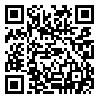Volume 27, Issue 1 (2025)
JAST 2025, 27(1): 63-79 |
Back to browse issues page
Download citation:
BibTeX | RIS | EndNote | Medlars | ProCite | Reference Manager | RefWorks
Send citation to:



BibTeX | RIS | EndNote | Medlars | ProCite | Reference Manager | RefWorks
Send citation to:
Rahimi M K, Abbasi E, Bijani M, Tahmasbi G, Azimi Dezfouli A. Assessment of Sustainability Trend of Apicultural Industry: Evidence from Beekeepers in Iran. JAST 2025; 27 (1) :63-79
URL: http://jast.modares.ac.ir/article-23-69402-en.html
URL: http://jast.modares.ac.ir/article-23-69402-en.html
Mohammad Kazem Rahimi1 
 , Enayat Abbasi *
, Enayat Abbasi * 
 2, Masoud Bijani1
2, Masoud Bijani1 
 , Gholamhossein Tahmasbi3
, Gholamhossein Tahmasbi3 
 , Aliakbar Azimi Dezfouli4
, Aliakbar Azimi Dezfouli4 


 , Enayat Abbasi *
, Enayat Abbasi * 
 2, Masoud Bijani1
2, Masoud Bijani1 
 , Gholamhossein Tahmasbi3
, Gholamhossein Tahmasbi3 
 , Aliakbar Azimi Dezfouli4
, Aliakbar Azimi Dezfouli4 

1- Department of Agricultural Extension and Education, Faculty of Agriculture, Tarbiat Modares University, Tehran, Islamic Republic of Iran.
2- Department of Agricultural Extension and Education, Faculty of Agriculture, Tarbiat Modares University, Tehran, Islamic Republic of Iran. ,enayat.abbasi@modares.ac.ir
3- Animal Science Research Institute (ASRI), Agricultural Research, Education and Extension Organization (AREEO), Karaj, Islamic Republic of Iran.
4- Agricultural Planning, Economic and Rural Development Research Institute (APERDERI), Tehran, Islamic Republic of Iran.
2- Department of Agricultural Extension and Education, Faculty of Agriculture, Tarbiat Modares University, Tehran, Islamic Republic of Iran. ,
3- Animal Science Research Institute (ASRI), Agricultural Research, Education and Extension Organization (AREEO), Karaj, Islamic Republic of Iran.
4- Agricultural Planning, Economic and Rural Development Research Institute (APERDERI), Tehran, Islamic Republic of Iran.
Abstract: (976 Views)
This study was designed to analyze the sustainability trend of the apicultural industry. The present investigation was conducted with a focus on quantitative aspects and employed the methodology of quantitative-qualitative trend analysis. The statistical population consisted of all beekeepers in Iran. Using multi-stage random sampling method, 453 beekeepers were selected and studied as a sample. The primary instrument employed to gather data is a questionnaire developed by the researcher. The sustainability of Iran's apiculture industry was evaluated based on four environmental, economic, social, and institutional dimensions. The evaluation of the beekeeping industry's sustainability in terms of the environmental aspect involved the assessment of eleven criteria across two categories, both of which exhibited a declining trend. Sustainability was evaluated in the form of 24 criteria and 5 categories in the economic aspect, of which two categories had a negative trend and three categories had a positive trend. The assessment of the social aspect's sustainability was conducted through examination of 19 criteria organized into three distinct categories. These categories represented different trends: one with a negative trend category, another with a stable trend category, and the third with a positive trend category. Finally, sustainability of the institutional dimension was evaluated by 16 criteria in the form of 3 categories, and all three categories had a negative trend. Therefore, reforming the process of environmental and institutional criteria shall be of priority for the planners and policy makers of Iran's apiculture industry. The results of this study can be used as basic information in the foresight of the beekeeping industry, the preparation of the vision document, as well as the strategic planning of the development of this industry.
Article Type: Original Research |
Subject:
Agricultural Extension and Education/Agricultural Development
Received: 2023/05/25 | Accepted: 2024/01/11 | Published: 2024/03/31
Received: 2023/05/25 | Accepted: 2024/01/11 | Published: 2024/03/31
Send email to the article author
| Rights and permissions | |
 |
This work is licensed under a Creative Commons Attribution-NonCommercial 4.0 International License. |






